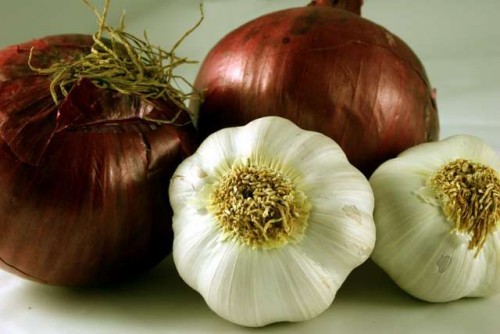|
CUCUMBER, MELONS, ONIONS, LEEKS AND GARLIC >> Things
of the Sensual-corporeal Man
 Though melons are sweet and fruitlike, they contain little nourishment, yielding little but sweetened water for refreshment. In cucumbers, the water is not sweetened, but perhaps is slightly mucilaginous. They both grow upon vines running upon the ground, or lifting themselves very slightly by tendrils; holding themselves among fruit trees like the serpents among animals. In Egypt they are planted in the mud or sand of the bed of the Nile, as the waters recede in early spring; and soon bring their fruits to maturity. Though melons are sweet and fruitlike, they contain little nourishment, yielding little but sweetened water for refreshment. In cucumbers, the water is not sweetened, but perhaps is slightly mucilaginous. They both grow upon vines running upon the ground, or lifting themselves very slightly by tendrils; holding themselves among fruit trees like the serpents among animals. In Egypt they are planted in the mud or sand of the bed of the Nile, as the waters recede in early spring; and soon bring their fruits to maturity.
The Israelites, weary of the manna from heaven, said, “We remember the fish which we did eat in Egypt for nothing; the cucumbers, and the melons, and the leeks, and the onions, and the garlic” (Numbers 11:5), “all of which,” Swedenborg says “signify such things as are of the lowest natural, that is, the sensual-corporeal man” (Apocalypse Explained #513).
The sensual-corporeal part of man is strictly that which hungers and thirsts, and is affected by the things which please the palate, the eyes, the ears, the smell, and the touch. The part of the mind that is affected by these things loves also to hear of them, and is affected by knowledge concerning them or agreeing with them. A good sensual-corporeal mind likes in the news of the day such things as relate to innocent pleasure, and such as give warning of evil; but the more common perverse form loves the things that minister to evil. The melons and cucumbers are watery, and medicinally produce colic, and other affections of the digestive organs; and therefore they appear to be related to the intellectual senses, through which the mind is instructed—the hearing and sight especially.
When Elisha was visiting the company of the prophets in Gilgal, “he said unto his servant, Set on the great pot, and seethe pottage for the sons of the prophets. And one went out into the field to gather herbs, and found a wild vine, and gathered thereof wild gourds his lap full, and came and shred them into the pottage; for they knew them not. So they poured out for the men to eat.
And it came to pass as they were eating of the pottage, that they cried out, and said, O man of God, there is death in the pot. And they could not eat thereof” (2 Kings 4:38–40). The pottage represents such instruction as they loved in merely literal things; and the “wild gourds” from the vine (supposed to be the colocynth, or bitter cucumber) represents erroneous ideas from natural, untaught, and untrained thought. And the casting in of meal, by which Elisha cured the evil, represents the application to genuine usefulness, by which idle speculation is made harmless. At their best, however, such vines cannot represent anything better than a knowledge of orderly pleasures of sense, and especially of sight and hearing.
The onions and leeks and garlic are valuable for their bulbs, which are the thickened bases of the leaves, growing in the surface of the ground. They represent an intelligence of no greater elevation than the others, and of less scope. From their pungency, and their relation to diseases of the skin, it would appear that the sensual-corporeal subjects to which they are related are those of the sense of touch and taste, and in some degree of smell, which are the senses which especially affect the feelings, as the sight and hearing do the thoughts. The plants are biennials, and the edible bulbs are the deposits of the first year’s accumulation at the base of the leaves, which would furnish materials for the flowers and seeds of the second year. The food thus obtained has relation to knowledge, in this case sensual knowledge, gathered not with an immediate view to use, but as a good in itself, for present pleasure.
Author: JOHN WORCESTER 1875
|
|